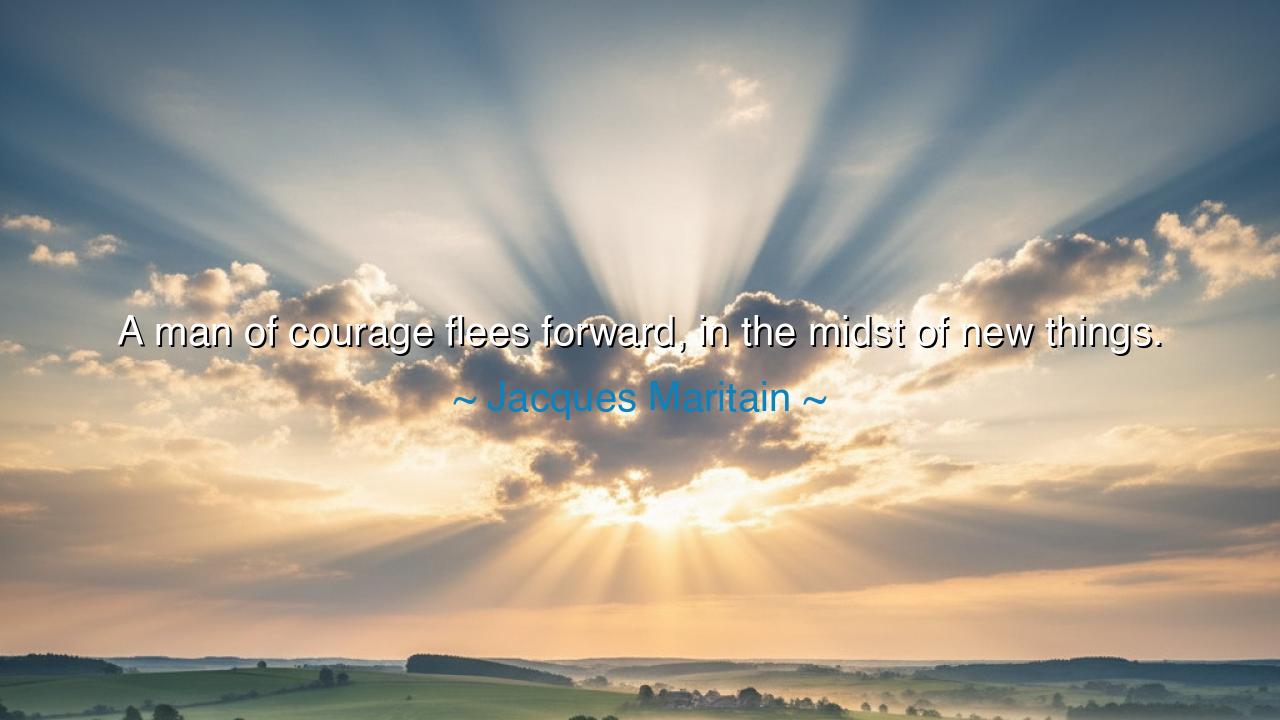
A man of courage flees forward, in the midst of new things.






“A man of courage flees forward, in the midst of new things.” Thus spoke Jacques Maritain, philosopher and seeker of divine truth, whose words carry the thunder of moral strength and the quiet light of faith. His declaration is no mere call to bravery—it is a revelation of how true courage acts in the soul. For the ordinary man flees backward, away from danger, toward the familiar and the safe. But the man of courage—he flees forward, into the unknown, where the winds of change howl and the path is uncertain. He does not run from fear; he runs through it, transforming flight into advancement, retreat into rebirth.
To flee forward is to defy despair. It is to stand before the chaos of life—the sudden loss, the unexpected trial, the crumbling of what once seemed eternal—and instead of retreating, to stride into the storm with eyes lifted and heart aflame. The coward seeks shelter in what once was; the courageous seek renewal in what may yet be. This is the divine paradox of courage: it is born not in stillness, but in motion. It is not the absence of fear, but the act of pressing onward despite it.
Consider the tale of Ernest Shackleton, the Antarctic explorer whose ship, Endurance, was swallowed by ice in 1915. Trapped with his men in a frozen wasteland, he faced death on every side. Yet he did not turn inward to despair or backward to regret. He fled forward, across the endless sea and through the heart of winter itself, leading his men on an 800-mile journey to survival. In that crucible of frost and fear, Shackleton revealed the essence of Maritain’s wisdom: when the world collapses behind you, courage demands that you build a new one ahead.
Maritain himself lived through the trembling of the 20th century—two world wars, the collapse of old empires, and the rise of new uncertainties. As a philosopher, he saw that modern man, in the midst of these upheavals, faced not only external battles but also an inner one: whether to cower before the unfamiliar or to embrace it. His words call to that timeless struggle. The new things of which he speaks are not merely inventions or discoveries, but transformations of the human spirit—moments when destiny demands that we evolve or perish.
For every soul, there comes a moment when the past can no longer sustain us. The beliefs that once comforted us grow thin; the paths we trusted end in fog. In that hour, the man of courage does not cling to ruins. He flees forward, seeking truth beyond what he has known. It may be the journey of faith through doubt, of love after heartbreak, of purpose born from failure. Such flight is not weakness—it is renewal, the holy momentum of becoming.
To live by this teaching is to practice spiritual bravery. Each day, you must step toward what frightens you—toward change, uncertainty, and the new. Do not worship the safety of what is old merely because it is known. The river of life moves ever onward; those who resist its current are drowned, while those who flow with it discover new shores. Courage, therefore, is not a shield but a compass pointing always to the unexplored horizon.
The lesson is this: in times of fear, do not seek to go back. The past offers only the illusion of safety. Instead, flee forward—into growth, into discovery, into the mystery of becoming more than you were. For life is a sacred pilgrimage, and every step taken with courage renews the soul. When the heart trembles before the unknown, remember Maritain’s truth: it is better to stumble toward the future than to stand secure in decay. And so, my child, when all around you shifts and changes, do not look behind you—run forward, for that is where life awaits.






AAdministratorAdministrator
Welcome, honored guests. Please leave a comment, we will respond soon